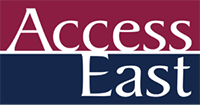The Access East Pharmacy Program
We added our first full-time pharmacist in 2007. The change was in response to the increase in high-risk, blind, elderly, and disabled patients with diverse medication regimens often involving multiple prescribers, putting those patients in jeopardy of multiple-medication-related problems.
Serving a complex patient base across 27 eastern North Carolina counties, our Access East pharmacy staff now includes:
-
- One pharmacy program director, who is a clinical pharmacist
- Two additional clinical pharmacists
- Two pharmacy program assistants, to help with administrative pharmacy tasks
Based primarily in the Access East office in Greenville, N.C., our pharmacy director coordinates Access East pharmacy program, though still spending about 40 percent of work time with clinical tasks.
Integrated into our care-management teams, our clinical pharmacists devote as much as 95 percent of their time to clinical tasks, working in tandem with our nurse care managers, social work care managers, and patient advocates, as well as with several partner physician practices.
Primary Pharmacist Responsibilities
-
- Medication management, including medication reconciliations, or “med-recs,” to optimize patient drug regimens and health improvement
- Assisting medical providers in the care of patients with chronic diseases, to include:
- Creating and managing drug regimens
- Meeting with patients in their homes and/or at medical appointments
- Performing other services within our pharmacists’ professional area of expertise
- Education of care-management staff, as well as local pharmacists, medical providers, and other healthcare professionals, on Access East and Medicaid pharmacy initiatives
- Coordinating and supporting such pharmacy initiatives and programs as are listed below
Pharmacy Initiatives
-
- A+KIDS (Antipsychotics – Keeping It Documented Safely). Promoting appropriate monitoring of antipsychotics use in N.C. Medicaid and Health Choice youth.
- ASAP (Adult Safety with Antipsychotic Prescribing). Promoting safe prescribing of off-label antipsychotics for Medicaid-eligible adults.
- Hepatitis C Medications. Outlining methods of Prior Approval (PA) requests for Hep-C medications through NCTracks.
- Medicaid Preferred Drug List (PDL). Listing for the purpose of N.C. Medicaid obtaining better prices on covered outpatient drugs through supplemental rebates.
- NC Controlled-Substance Reporting System (CSRS). Statewide reporting system to help identify abusers/misusers of prescribed Schedule II-V controlled substances.
- Narcotic Lock-In Program. State program restricting Medicaid recipients identified for “lock-in” to a single prescriber and pharmacy for obtaining certain frequently abused medications.
- NCTracks Pharmacy Call Center. Contact information.
- Opioid-use reduction: The Centers for Medicare & Medicaid Services (CMS) have outlined a roadmap toward tackling thi spiraling national epidemic.
